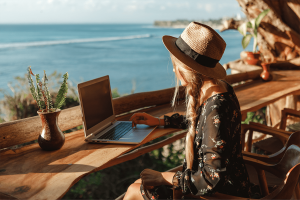



Summer is about to come and, along with it, getaways, longer trips and second-home journeys will come too. Very often, work becomes an unavoidable travel mate that will require specific security measures.
These measures must start even before leaving our home. Cybercriminals take advantage of holiday periods to launch social engineering attacks using really tempting offers as bait. Therefore, before hiring a trip, both business or personal trips, we should make sure that the tour operator is genuine. A simple way to verify its authenticity is by using a different channel, for example, calling the travel agency to check if the offer does exist. In the moment to pay, the site must redirect to a payment gateway managed by a bank and, like in any other online payment process, it is strongly recommended to use a prepaid card.
Before leaving our home, it is also a good idea to make sure that our devices are already updated, mainly the corporate ones -updates fix vulnerabilities and, very often, they need Wi-Fi connection to be installed-. It is also convenient to switch off the router if we are going to be away for a while, that way we make it more difficult that someone could do something illegal by using our Internet connection.
Among the measures to adopt during the trip, the most basic one is not to leave our devices unattended or unlocked, mainly if they are corporate devices. In case they run out of battery, the highest recommended way to recharge them is by plugging them in to a wall socket or by using a power bank, avoid entirely connecting them to USB charging points, such the ones placed in airports or coffee shops, since through these USB charging points there can be an exchange of data and devices can get infected with malware. In case of an emergency, if there is no way to avoid using a USB charging point, we can protect our devices by using a USB shield. This is a little adapter which we have to place between our device and the USB charging point and that only allows the pass of the energy flow. This protects both personal and corporate information.
Regarding Internet networks when traveling, we should avoid connecting our devices to public Wi-Fi nets even if they are protected by a password, such as the hotel ones, as nothing guarantees there is not a malicious user connected to the same net. It is better to use mobile data. In any case, we should avoid consulting sensitive information or entering access credentials if we are connected to a public Wi-Fi net. If it is necessary to consult corporate confidential information, to check our mailbox or to make a money transfer, we had better use our mobile data and connect our devices to our corporate virtual private network (VPN) to make sure that the information travels encrypted.
Moreover, whenever it is necessary to manage sensitive information, we should verify that there is no one around looking at what we are doing or eavesdropping on our conversation.
Another recommendation in order to protect our physical security and our belongings is to avoid sharing our location in social networks, for example, when we are attending a congress. This involves denying the access to our location to the apps that are installed in our devices, so that our location does not get registered in the metadata of the pictures we take and post.
Finally, when we no longer need those traveling documents that have our personal information (such as boarding passes or hotel reservation documents) and we want to throw them away, we must avoid getting rid of them in public places like, for example, in the bin of a hotel room. We must eliminate them safely once we are back home. Of course, this also applies to confidential documents (such as a list of clients we have met in a congress). In the same way, it is strongly recommended to delete those apps downloaded exclusively for the trip, as they have access to our data and it is quite unlikely that we will use them again.

How to enjoy cybersafe holidays?
Mistrust very tempting offers
Make sure that the tour operator is genuine and the platform is safe
Switch off the router if you are going to be away for a few days
Avoid leaving your devices unattended or unlocked
Recharge your devices by plugging them in to a wall socket or in to a power bank, or make use of a USB shield
Avoid connecting your devices to public Wi-Fi networks, you had better use your mobile data
Avoid accessing sensitive information in public places
Avoid posting pictures of your trip in real time or sharing your location
Get rid of the traveling documents safely
Delete the apps downloaded exclusively for the trip and the Wi-Fi networks you connected your devices to